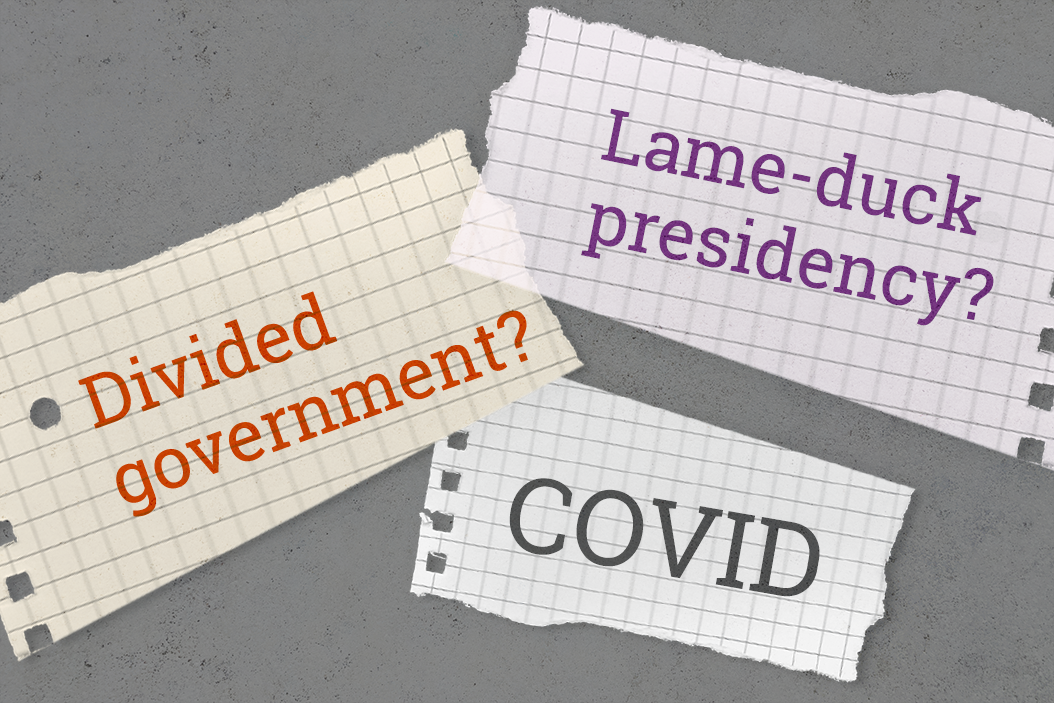November 05, 2020
The US presidential election has yet to be called, but as things currently stand, Joe Biden is on track to win the 270 electoral college votes needed to clinch the US presidency. The horse race is still being closely monitored, and questions about why certain states and counties went for Trump or Biden will be addressed in the days ahead. But when all is done and dusted and the next president (likely Biden based on current projections) assumes his place in the White House on January 20, 2021, the issues he will have to tackle on day one will be as varied as they are challenging
Lame-duck shenanigans. The lame-duck interval — the 11-week period before a sitting president is replaced by a successor — is often chaotic and unproductive. In previous lame-duck periods, Congressional leaders have ignored requests from outgoing presidents, while the chief executive has issued 11th-hour executive orders and occasionally controversial pardons for some accused or convicted of crimes. (FiveThirtyEight has recorded a spike in presidential pardons towards the end of lame-duck terms.)
But if Biden wins, the upcoming lame-duck session could be more tumultuous than ever. Facing a string of legal troubles, Trump could opt to self-pardon, a move with no precedent in American history that could further inflame tensions within a deeply divided nation. He could also resign and ask acting president Mike Pence to pardon him. (There is no pardon that covers state and local tax fraud charges Trump might face in New York.)
Additionally, funding for the federal government is set to expire on December 11, requiring the Trump administration and Congress to work together to avoid a government shutdown like the one seen in 2018 when the government shuttered for 35 days. An aggrieved (and outgoing) President Trump may not be in a very cooperative mood, resulting in a shutdown-standoff that could bruise an already ailing US economy burdened with an ongoing pandemic.
A government divided. If Joe Biden wins, he will be the first president in almost four decades to take the helm without his party controlling both chambers of Congress — the House of Representatives and the Senate. (In case things don't appear complicated enough, it's worth noting that two tight Senate races in Georgia — a traditionally red state — are likely headed to run-off elections in January that could determine which party holds a Senate majority.)
As vice president, Biden saw up close the perils of divided government when the Republican-controlled Senate obstructed his boss, Barack Obama, from confirming judicial appointments and passing key legislation.
Biden's plans on tax reform (including an overhaul of Trump's tax cuts for high-earning Americans), as well as his ambitious agenda for tackling climate change, would be dead in the water under a (very likely) Republican-controlled Senate led by majority leader Mitch McConnell.
That would also undermine his ability to deliver financial aid to Americans whose pocketbooks have been hit hard by the pandemic. If Biden wins but Republicans retain Senate control, a new stimulus package is likely, analysts say, but the amount of cash doled out would be significantly less than the $3 trillion Democrats in the lower house have been pushing for.
Remember COVID? Over the past 48 hours, Americans — and non-Americans — have been fixated on vote tallies in Arizona, Nevada, Georgia, and Pennsylvania. But while we were distracted, the US passed a grim milestone Wednesday, recording 100,000 new cases of COVID-19, the biggest single-day count since the pandemic started. States including Indiana, Wisconsin, Iowa, and Minnesota (mainly in rural areas) are grappling with ballooning outbreaks as the US surpassed 9 million total coronavirus cases, the most of any country in the world.
Biden has campaigned largely on Trump's failure to contain the virus and his own promise to defer to health officials on issues like how and when to reopen schools safely. But those decisions are largely made at a local level. Biden has also said that he would consider a nationwide mask mandate, but he would need to convince all 50 governors to enforce mask-wearing in their respective states — a very difficult feat at this hyper-partisan time.
In sum: Once all the votes are counted, we'll see that more than 70 million Americans voted to keep Donald Trump in the White House. The United States is more politically polarized than at any time in decades, and even as president, Joe Biden will have to negotiate and compromise to advance any of his agenda.
More For You
People in support of former South Korean President Yoon Suk Yeol rally near Seoul Central District Court in Seoul on Feb. 19, 2026. The court sentenced him to life imprisonment the same day for leading an insurrection with his short-lived declaration of martial law in December 2024.
Kyodo
65: The age of former South Korean President Yoon Suk Yeol, who was sentenced to life in prison on Thursday after being found guilty of plotting an insurrection when he declared martial law in 2024.
Most Popular
In an era when geopolitics can feel overwhelming and remote, sometimes the best messengers are made of felt and foam.
Hungarian Prime Minister Viktor Orban holds an international press conference in Budapest, Hungary, January 5, 2026.
REUTERS/Bernadett Szabo/File Photo
The Hungarian election is off to the races, and nationalist Prime Minister Viktor Orbán is facing his most serious challenger in 16 years.
How people in G7 and BRICS countries think their policies will effect future generations.
Eileen Zhang
Does skepticism rule the day in politics? Public opinion data collected as part of the Munich Security Conference’s annual report found that large shares of respondents in G7 and several BRICS countries believed their governments’ policies would leave future generations worse off.
© 2025 GZERO Media. All Rights Reserved | A Eurasia Group media company.
